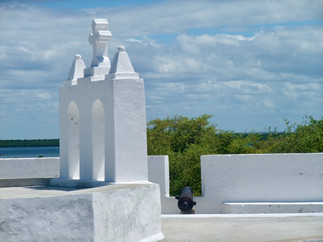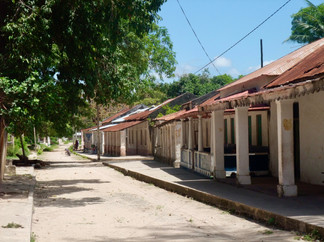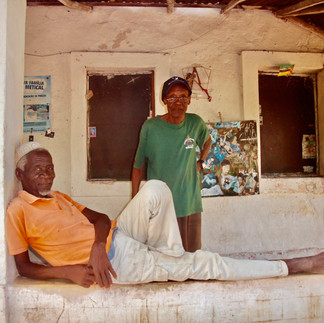Ibo Island, situated within Mozambique's Quirimbas Archipelago, boasts a rich and multifaceted history stretching back centuries.

The epic history of an exotic island
The earliest inhabitants of Ibo Island were likely small fishing and farming communities, possibly Bantu-speaking peoples, who lived on the island before the arrival of Arab traders in the 7th century. 15th-century Portuguese explorers, led by Vasco da Gama, ventured into the region in 1492 and immediately recognised the island's strategic importance as a centre for trade. After decades of sporadic conflict, the Portuguese finally took control of Ibo Island from the Arabs in 1590, giving them seven of the nine biggest islands in the archipelago, with only two remaining in the hands of Muslim traders. The victors chose Ibo as their base in the Quirimbas for its permanent rainwater sources, and the island became a pivotal port, serving as an essential link between the markets of Mozambique, India, and the Far East.
The 18th and 19th centuries were a dark period in Ibo's history. The island emerged as a prominent centre for the East African slave trade, rivalling Zanzibar to the north. The Portuguese held captured mainland Africans in Ibo's fortress before shipping them to European colonies or Arabia.
Slavery wasn't the only trade allowing Ibo to thrive during its heyday. Ivory, silver, and gold flowed through its busy port. Ibo became known for its silversmiths and intricate silver filigree work, a craft introduced by Arab traders and still practised today. If you wander up to the fortress overlooking the Ibo Channel, you'll find Ibo artisans creating and selling their exquisite silver crafts in the shade of the ancient walls and alcoves.
With abolition, the slave trade declined rapidly in the 19th century. Along with the death of the slave trade, the growing importance of other northern Mozambican ports like Pemba led to a gradual decline in Ibo's significance. The island, once a bustling trade hub, slipped into obscurity, a forgotten remnant of a bygone age.
Ibo wasn't isolated from Mozambique's fight for independence from Portuguese colonial rule in the 1960s and 1970s. It was never a battleground, but the Quirimbas region was pivotal in the birth and growth of the separatist struggle. While the island was not a major battleground, the broader fight for independence and subsequent civil war drained an entire generation of young men and women from the island. It accelerated Ibo's dive into obscurity, with its once vibrant port town falling into abandoned ruin.
Ibo Island in the 21st-century
In the first decade of the 21st century, Ibo Island was rediscovered, primarily by adventurous tourists seeking a destination away from the madding crowd. Ibo's unique blend of African, Arab, and European influences, manifesting in the island's architecture, cuisine, and culture, has made Ibo a sought-after destination. The island's pristine beaches, mangrove forests, and rich marine life amplify its allure.
Diving the shallow, teeming walls offshore from Ibo's lighthouse will always be one of my lasting memories. After leading our dives, I used to love powering through the winding Ibo Channel in a fast, rigid-inflatable-boat, passing beneath the crenellated walls of the Fortaleza de São João Baptista, a star-shaped fortress built at the end of the 18th century to protect Ibo Channel against a possible French. I could imagine it as it was centuries before, bristling with canon as it protects the narrow waterway. My boat would be met by a host of local kids ready to take the sand anchor and guide clients around their island home. I'd wander through the sandy streets of the port town, its sidewalks lined by the decaying remnants of European-esque townhouses and shop fronts sporadically inhabited by islanders identifying their inhabitance with a riot of colour among decrepit ruins. How could anyone not be inspired?
The old Portuguese customs house is another fascinating journey back through time. For a small fee, you can ask one of the island's old-timers to unlock the padlock and allow you to wander through the neglected structure. There are rooms filled with old shipping manifests and records from the colonial era and offices appearing as if workers have stopped work, walked out, left everything in its place, and locked the door behind them. Today, efforts are underway to restore and conserve Ibo's historic buildings, particularly its fortresses and old colonial structures.
Ibo Island and HUNTER of MEN

It's easy to see why Ibo features so prominently in HUNTER OF MEN.
During the time I spent living and working in the Quirimbas I made the sea crossing often to the fascinating Island port to dive, visit friends, and take a break from the arduous work I was involved with to the north. Ibo Island Lodge is a real place. The affable Jannie de la Ray and his wife, Della, don't own the real Ibo Island Lodge. Still, it is a beautiful old colonial mansion repurposed into a friendly and welcoming tourist lodge. The Ibo Lighthouse dive site featured in the early chapters is one of the best in the region and a ‘must-do’ if you're diving in the Quirimbas. Matemo Island, Where Jack Decker and Ali Baptiste build Swahili Lodge is only a short sea journey north in a fast RIB and really did have a lovely, barefoot resort. However, the security situation in the region has effectively killed the northern Mozambique tourist trade for the time being.
Even HUNTER OF MEN's Senhor Baptiste is inspired by a real-life inhabitant of Ibo, no longer walking the cobble and sand streets of Ibo but living forever in the stories he shared with three generations of islanders. Jao Baptiste was an ancient, gregarious resident of Ibo with a lifetime of stories to tell, some tall, some dark, some so mesmerising I could have spent days sitting on his porch.
A word of warning…
So, should you take the path less travelled and discover your way to the haunting Ibo Island? You absolutely should, just not right now.
There is currently an extreme risk of terrorism in the Mozambique province of Cabo Delgado. Most official travel advisory bodies advise not to travel to Cabo Delgado and the Quirimbas. Terrorists have been targeting areas frequented by foreigners, where foreign companies operate and expatriate staff reside.
The humanitarian situation in northern Mozambique worsened in recent years as attacks by an Islamic State (ISIS)-linked group, known locally as Al-Shabab or "Mashababos", plague the beautiful and once peaceful region. Abductions and destruction of homes have made life in the Quirimbas a dangerous proposition, and many families have fled south to the major towns and cities. The violence has displaced thousands of people. Recently, local Al-Shabab fighters reportedly killed at least 15 civilians in Cabo Delgado and staged a series of attacks in the Ancuabe district, 45 kilometres from the provincial capital, Pemba, an area previously considered safe, killing at least seven people with horrendous brutality and forcing thousands more to flee their homes.












































Comments